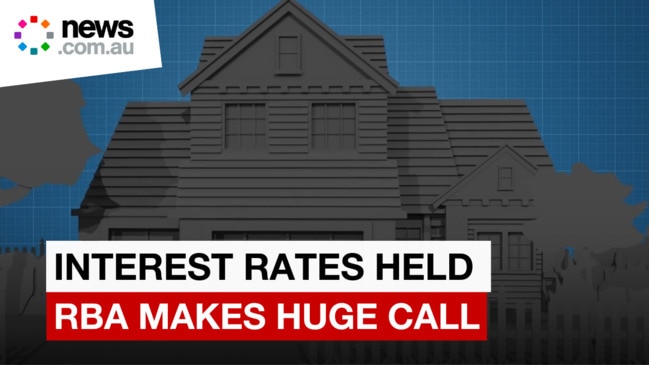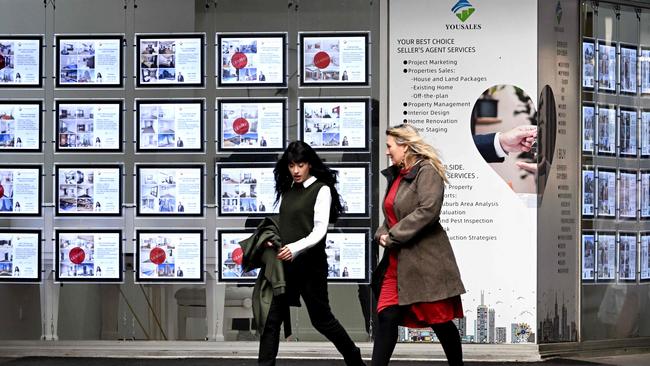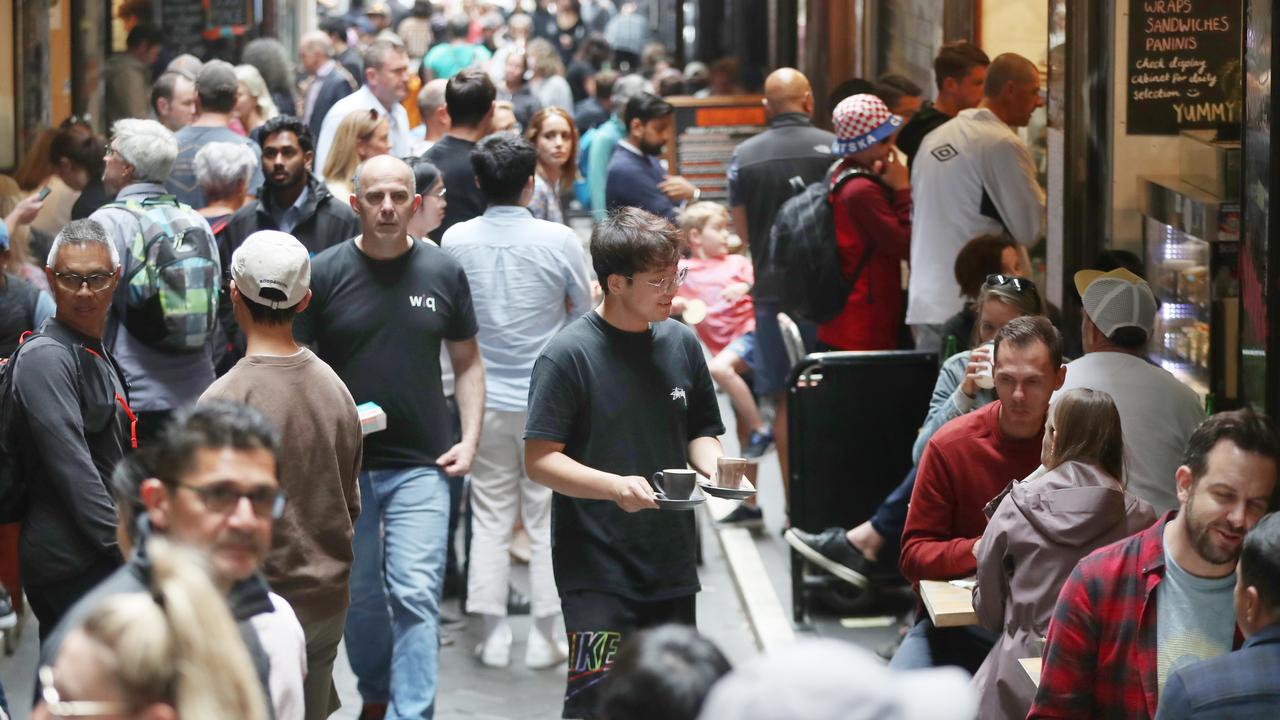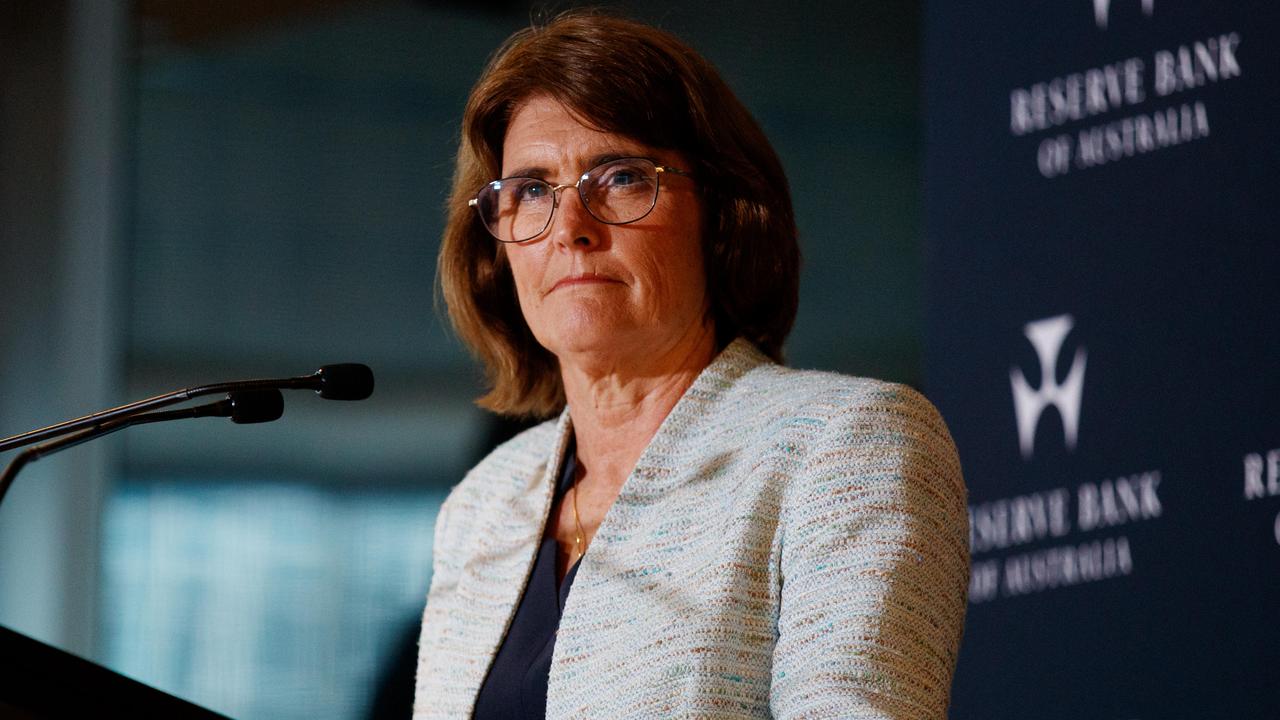August interest rates: RBA makes huge call on interest rates
The Reserve Bank of Australia has revealed if homeowners will take another hit when it comes to their mortgage repayments.

Interest Rates
Don't miss out on the headlines from Interest Rates. Followed categories will be added to My News.
Homeowners are breathing a sigh of relief after the Reserve Bank of Australia (RBA) made a decision not to raise interest rates in August.
Interest rates will remain at 4.35 per cent with most economists having predicted that the RBA would hold the cash rate.
Deloitte Access Economics partner Stephen Smith said holding interest rates was the right decision for Australian businesses and households and reduces the risk of a recession.
“It is now looking increasingly certain that the next move in the cash rate will be down, not up, with the RBA clearly concerned that its quest to stamp out inflation might derail an emerging recovery,” he said.
“With inflation trending down, a weak Australian economy, and rising volatility in global markets, Australia needs an environment where business can invest for growth.
“The Reserve Bank is walking a tightrope, balancing its twin objectives to fight inflation and maximise employment in the economy.”

However, AMP chief economist Shane Oliver said mortgage holders were bearing too much of the brunt to bring down inflation.
“Tighter fiscal policy in the form of tax hikes and spending cuts or maybe a 1 per cent super levy on everyone would better spread the burden,” he said.
“But that would mean politicians would have to do things that are politically unpopular and history shows that they cannot be relied upon to do that.
“So responsibility for controlling inflation should remain with the RBA and that unfortunately means the burden remains on mortgage holders.
“Of course it’s worth recalling that existing mortgage holders were big beneficiaries of falling interest rates in the 1990s, 2000s and 2010s.”
‘Tempt a recession’
Despite fears that the latest inflation data could make an interest rate hike inevitable, it showed the crisis was starting to slow.
The data showed Australia’s annual rate of inflation rose to 3.8 per cent, up from 3.6 per cent at the start of the year – a figure that wasn’t higher than the RBA’s own forecast.

Mr Smith said the data showed inflation was “not running rampant” but instead the core annual inflation figure had fallen for the sixth consecutive quarter — reaching its lowest rate in two years.
“The factors driving Australian inflation at the moment cannot be fixed through interest rate hikes. Namely, rents due to housing supply constraints, fruit and other food prices due to weather, and insurance premiums due to previous increases in the cost of claims and weather events,” he noted.
“Higher rates only fight inflation on the demand side by subduing spending. Australia’s economy is already weak with investment and consumption in the economy too low, and with business insolvencies escalating.
“One thing is clear, the Australian economy is not overheating.”

Globally, interest rates are falling in many economies that were hit by post-pandemic inflation spikes earlier than Australia, Mr Smith added.
“This suggests Australia is a few months behind a global trend of interest rates being reduced from recent highs,” he said.
APAC economist at State Street Global Advisors Krishna Bhimavarapu agreed the inflation data reinforced the view that the interest rates are restrictive enough in Australia and the next move by the RBA could very likely be a cut in November 2024.
Finder’s head of consumer research Graham Cooke said homeowners were anxiously waiting for an interest rate cut.
“Millions of Aussie borrowers are experiencing significant mortgage stress due to the fact that their monthly repayments have blown out so much and so rapidly,” he said.
“They’re waiting with bated breath for any sign of relief from the RBA.”
Opinion is divided on whether interest rate relief could hit at the end of the year, while many aren’t predicting interest rates to be slashed until 2025.
Interest rate cuts
BDO Economics partner Anders Magnusson forecast the first rate cut for 2025 – potentially early in the year.
“The RBA has made the right decision to hold the cash rate and few economists will disagree. This inflation cycle is a marathon, and RBA is staying composed through the last mile, despite recent criticisms that it’s not doing enough to tackle persistent inflation,” he said.
“The RBA will be keeping a close eye on public demand as strong spending on National Disability Insurance Scheme, Medicare and the Pharmaceutical Benefits Scheme has led them to delay their forecast return of inflation to the target band to late 2025.
“They will also be considering how the stage three tax cuts will impact inflation, which we won’t know until the inflation data release in October.”
The RBA cannot influence the price of some items in the CPI basket, such as utilities and non-market goods, he added.
“Inflation for the items that it can influence is already within the RBA’s target band. Recent retail sales data shows that lever in action, with a consistent decline in retail sales volume as well as per capita retail volumes as consumers continue to tighten their belts,” he noted.
“While the unemployment rate and underlying inflation are moving in the right direction, progress is slow.”
However, underlying inflation while stubbornly high, has steadily declined for six consecutive quarters and was just above the RBA’s forecast for the June quarter, Mr Magnusson said.

Unsurprisingly, the recent volatility in the financial markets and the depreciation of the Australian dollar got the RBA’s attention in this meeting, said KPMG senior economist Dr Michael Malakellis.
He said KPMG shares the RBA’s perspective that inflation will remain sticky.
“Indeed, the RBA has revised its inflation outlook to reflect a more persistent path compared to three months ago, citing factors such as resilient domestic demand and geopolitical uncertainties,” he commented.
“Additionally, we believe that fiscal policy, in the shape of cost of living relief measures and the Stage 3 tax cuts, will also contribute to prolonging the deflationary process
“.Our central view continues to be that the RBA will not need to raise rates further, although we agree that the risks to inflation in the near term are to the upside and it will take a little longer to get inflation back within the RBA’s target zone.”

The US economic slowdown
The rate of growth in home prices has consistently slowed over the past five months and the market continues to see the lowest number of annual dwelling approvals in more than a decade, said PropTrack director of economic research Cameron Kusher.
“Despite slowing price growth, more properties are being listed for sale and sales volumes remain robust. Stable interest rates are likely to support vendor and purchaser confidence as we head into the busier spring period,” he said.
“The job is certainly not done on inflation, it is still too high and rising at too fast of a pace to bring it into the target range.
“While we should remain cautious to the prospect of interest rates rising if inflation doesn’t slow, economic data from the US published last week showed a significant weakening of the labour market and heightening expectations of an economic slowdown in the US.
“This could reduce the likelihood of further interest rate rises here and potentially result in rates being cut sooner.”

Calls for rate cuts now
But the Australian Council of Social Service (ACOSS) had called for a rate cut in August arguing the economy and job market are weak.
It said official interest rates went too far last year, shifting the balance of risks from an upsurge in inflation to an upsurge in unemployment and a recession.
It found since rate rises began in 2022, 75,000 Aussies have lost their jobs, the number of vacancies for entry-level jobs has declined by almost a third, while 60,000 jobs are under threat if unemployment rises to 4.5 per cent.
“The living standards of people on low and modest incomes have been decimated over the past few years, partly due to inflation but also due to higher interest rates,” said ACOSS acting CEO Edwina MacDonald.
“The danger now is not this temporary pause in reductions in inflation, but a faster rise in unemployment. The cure could become worse than the disease, as the impact of past increases in interest rates flows through to jobs and incomes.”

On average, Australians income per person has dropped by 8 per cent which is the equivalent of about $5000 a year.
However, Betashares chief economist David Bassanese said the economy had “dodged a bullet” for a rate rise in August but warned Australia is still dealing with a sticky inflation problem.
“But the RBA’s gun remains loaded and could still be fired this year if inflation fails to show further declines from what remain uncomfortably high levels,” he said.
“My base case is that inflation will fall further – though this also assumes the economy and consumer spending especially will remain reasonably soft, with the unemployment rate rising to 4.5 per cent by year-end.
“This could still see the RBA actually cut rates later this year or at least in the first half of 2025.”
Originally published as August interest rates: RBA makes huge call on interest rates





